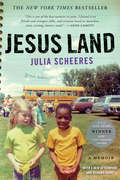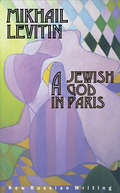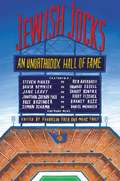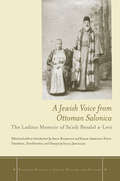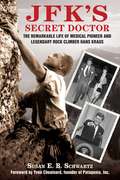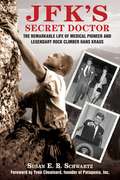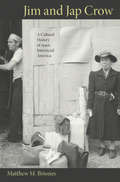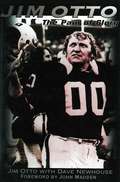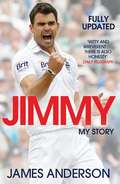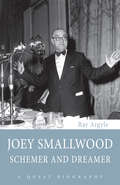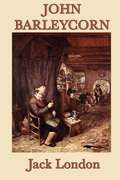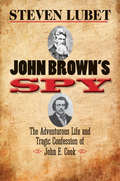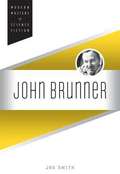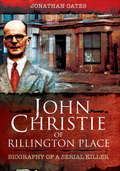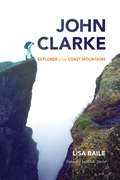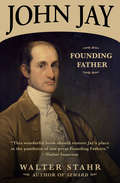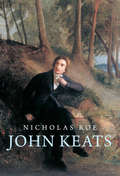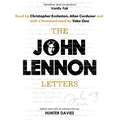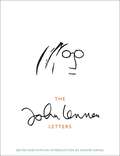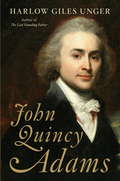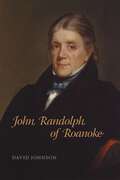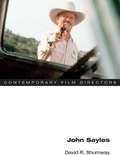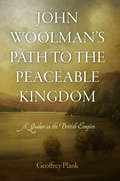- Table View
- List View
Jesus Land: A Memoir
by Julia ScheeresJulia and her adopted brother, David, are sixteen-years-old. Julia is white. David is black. It is the mid-1980s and their family has just moved to rural Indiana, a landscape of cottonwood trees, trailer parks, and an all-encompassing racism. At home are a distant mother-more involved with her church's missionaries than her own children-and a violent father. In this riveting and heartrending memoir Julia Scheeres takes us from the Midwest to a place beyond imagining: surrounded by natural beauty, the Escuela Caribe-a religious reform school in the Dominican Republic-is characterized by a disciplinary regime that extracts repentance from its students by any means necessary. Julia and David strive to make it through these ordeals and their tale is relayed here with startling immediacy, extreme candor, and wry humor.
The Jesus Lizard Book
by The Jesus LizardFeatured as a "This Week's Reading/What We're Loving" pick at The Paris ReviewNamed the Best Music-Related Book of 2014 by Joel Gausten"If you're a Jesus Lizard fan or a David Yow devotee, you're sure all over this. But even if you've never heard of the band, the book stands as one of the best ways to experience being in a tight, cohesive band. You get everything except the sweat, spilled beer, and blood. It's a fun ride, and the closest thing possible to getting in the van with these guys."--Mother Jones"The Jesus Lizard Book is a beautiful document of a band that wasn't afraid to be abrasive, chaotic, brutal, and sometimes, ugly."--The Chicago Tribune/Printers Row"These guys deserve to pat themselves on the back...If the spectacular photography in The Jesus Lizard Book is to be believed, their shows resembled nothing more than that scene in Indiana Jones and the Temple of Doom where some poor dude has his still-beating heart removed in an elaborate ritual."--The Paris Review"As a reader, you don’t need to hear the songs to appreciate the story--and Book delivers the band right to your coffee table loud and clear."--BoingBoing.net"The gorgeously crafted, 176-page hardcover Book...dives deep and candidly into the Jesus Lizard's first decade and touches a bit on that 2009 coda, too. Through many thousands of words, hundreds of photos, and collected ephemera, it celebrates the sweat, menace, humor, musicianship, lasting power, and genitals of one of the best bands ever coughed up by the rock underground."--The Village Voice"Book is a valuable document that brings us back to the era when artists were conditioned to practice the art of self-defense."--Pitchfork"A series of essays and photos that illuminates the Jesus Lizard--humorous, jolting, sometimes surprisingly moving."--The Chicago Tribune"If there is any recurring theme within the 176 pages of the newly released The Jesus Lizard Book it's this: The Chicago-grown noise rockers will be remembered as one of the greatest live bands to ever grace--or very well desecrate--the stage."--Chicago Sun-Times"Impressively candid, informed and informative history of a remarkable group of musicians. A 'must read' for their legions of appreciative fans...Highly recommended."--Midwest Book Review"Even if you're unfamiliar with or disinterested with the band's music, Book makes for an intriguing exploration of the alternative music scene of the '90s--a short burst in time when a band as gloriously odd as The Jesus Lizard could do whatever they wanted to do and get a pot of gold at the end of the rainbow."--Joel GaustenThe Jesus Lizard Book is a coffee table affair of exclusive photography, art, and other imagery with written pieces by all four members of the seminal indie rock band the Jesus Lizard. The layout is stylish and elegant, particularly in contrast with the harshness of much of the band's music. Included are many Polaroids by David Wm. Sims, a delicious recipe by David Yow, a concise list of every show the Jesus Lizard played, and writings by two producers who recorded the band--Steve Albini and Andy Gill. There is biographical material of each member that covers childhood to the demise of the group. Other contributors include, Mike Watt, Alexander Hacke, Steve Gullick, Rebecca Gates, Jeff Lane, Sasha Frere-Jones, KRK, Bernie Bahrmasel, and many more.
A Jewish God in Paris
by Mikhail Levitin"The picture resembles a Chagall painting. . . . Or perhaps this anti-autobiography is meant to satirize the old Russian question 'Who is to blame?' with the Jewish answer: Me."--The Times Literary Supplement In the title novella the hero, after a marital infidelity, takes his family to Paris hoping to win his beautiful wife's forgiveness.
Jewish Jocks: An Unorthodox Hall of Fame
by Franklin Foer Marc TracyJEWISH JOCKS: AN UNORTHODOX HALL OF FAME is a timeless collection of biographical musings, sociological riffs about assimilation, first-person reflections, and, above all, great writing on some of the most influential and unexpected pioneers in the world of sports. Featuring work by today's preeminent writers, these essays explore significant Jewish athletes, coaches, broadcasters, trainers, and even team owners (in the finite universe of Jewish Jocks, they count!).Contributors include some of today's most celebrated writers covering a vast assortment of topics, including David Remnick on the biggest mouth in sports, Howard Cosell; Jonathan Safran Foer on the prodigious and pugnacious Bobby Fischer; Man Booker Prize-winner Howard Jacobson writing elegantly on Marty Reisman, America's greatest ping-pong player and the sport's ultimate showman. Deborah Lipstadt examines the continuing legacy of the Munich Massacre, the fortieth anniversary of which coincided with the 2012 London Olympics. Jane Leavy reveals why Sandy Koufax agreed to attend her daughter's bat mitzvah. And we learn how Don Lerman single-handedly thrust competitive eating into the public eye with three pounds of butter and 120 jalapeño peppers. These essays are supplemented by a cover design and illustrations throughout by Mark Ulriksen.From settlement houses to stadiums and everywhere in between, JEWISH JOCKS features men and women who do not always fit the standard athletic mold. Rather, they utilized talents long prized by a people of the book (and a people of commerce) to game these games to their advantage, in turn forcing the rest of the world to either copy their methods-or be left in their dust.
A Jewish Voice from Ottoman Salonica
by Aron Rodrigue Sarah Abrevaya SteinThis book presents for the first time the complete text of the earliest known Ladino-language memoir, transliterated from the original script, translated into English, and introduced and explicated by the editors. The memoirist, Sa'adi Besalel a-Levi (1820–1903), wrote about Ottoman Jews' daily life at a time when the long-ascendant fabric of Ottoman society was just beginning to unravel. His vivid portrayal of life in Salonica, a major port in the Ottoman Levant with a majority-Jewish population, thus provides a unique window into a way of life before it disappeared as a result of profound political and social changes and the World Wars. Sa'adi was himself a prominent journalist and publisher, one of the most significant creators of modern Sephardic print culture. He was also a rebel, accusing the Jewish leadership of Salonica of being corrupt, abusive, and fanatical; that leadership, in turn, excommunicated him from the Jewish community. The experience of excommunication pervades Sa'adi's memoir, which documents a world that its author was himself actively involved in changing.
JFK's Secret Doctor: The Remarkable Life of Medical Pioneer and Legendary Rock Climber Hans Kraus
by Susan E.B. SchwartzSet against the grand panorama of twentieth-century world events, it captures the remarkable life and spirit of climbing and medical visionary Hans Kraus (1905-1966). Kraus was taught English by James Joyce, escaped Nazi dominated Europe, and was JFK’s secret back specialist. A legendary rock climber known for hair-raising ascents on two continents, Kraus lived a life filled with tragedy and triumph, intense passion, verve, and a whole lot of guts, glory, and wit. One of the great unsung medical pioneers of the twentieth century, Kraus made headline news throughout the second half of the 1950s, was a guest of honor at Eisenhower’s White House, and was the subject of cover stories in major magazines throughout America, including Sports Illustrated. His pioneering work in muscles and fitness uncovered a shocking truth about a lack of fitness in American children, and his work curing back pain brought him into the Kennedy White House and inner circle of Camelot. Here now is the life of Hans Kraus, including the behind-the-scenes story of Kennedy’s crippling back problems, based on new documentation, including White House medical records and interviews with two Kennedy White House doctors. Skyhorse Publishing, as well as our Arcade imprint, are proud to publish a broad range of books for readers interested in history--books about World War II, the Third Reich, Hitler and his henchmen, the JFK assassination, conspiracies, the American Civil War, the American Revolution, gladiators, Vikings, ancient Rome, medieval times, the old West, and much more. While not every title we publish becomes a New York Times bestseller or a national bestseller, we are committed to books on subjects that are sometimes overlooked and to authors whose work might not otherwise find a home.
JFK's Secret Doctor: The Remarkable Life of Medical Pioneer and Legendary Rock Climber Hans Kraus
by Yvon Chouinard Susan E.B. SchwartzJFK's Secret Doctor tells a thrilling story of adventure and a historic medical career. Set against the grand panorama of twentieth century world events, it captures the remarkable life and spirit of climber and medical visionary Hans Kraus (1905-1996). Kraus was taught English by writer James Joyce, escaped Nazi-dominated Europe, and was JFK's secret back specialist. A legendary rock climber, known for hair-raising ascents on two continents, Kraus lived a life full of triumph, tragedy, intensity, verve, and a whole lot of guts, glory, and wit. Few realized that the same man, considered one of the great unsung medical pioneers of the twentieth century, was also making headline news throughout the second half of the 1950s, was a guest of honor at Eisenhower's White House, and the cover story of major magazines throughout America, including Sports Illustrated. His pioneering work in muscles and fitness uncovered shocking truths about the health of American children, and his work curing back pain brought him into the Kennedy White House and inner circle of Camelot.Here is the life of Hans Kraus, including the previously untold story of Kennedy's debilitating back problems, including Kennedy's White House medical records and first-time interviews with two Kennedy White House doctors.
Jim and Jap Crow: A Cultural History of 1940s Interracial America
by Matthew M. BrionesFollowing Japan's attack on Pearl Harbor in 1941, the U.S. government rounded up more than one hundred thousand Japanese Americans and sent them to internment camps. One of those internees was Charles Kikuchi. In thousands of diary pages, he documented his experiences in the camps, his resettlement in Chicago and drafting into the Army on the eve of Hiroshima and Nagasaki, and his postwar life as a social worker in New York City. Kikuchi's diaries bear witness to a watershed era in American race relations, and expose both the promise and the hypocrisy of American democracy. Jim and Jap Crow follows Kikuchi's personal odyssey among fellow Japanese American intellectuals, immigrant activists, Chicago School social scientists, everyday people on Chicago's South Side, and psychologically scarred veterans in the hospitals of New York. The book chronicles a remarkable moment in America's history in which interracial alliances challenged the limits of the elusive democratic ideal, and in which the nation was forced to choose between civil liberty and the fearful politics of racial hysteria. It was an era of world war and the atomic bomb, desegregation in the military but Jim and Jap Crow elsewhere in America, and a hopeful progressivism that gave way to Cold War paranoia. Jim and Jap Crow looks at Kikuchi's life and diaries as a lens through which to observe the possibilities, failures, and key conversations in a dynamic multiracial America.
Jim Otto: The Pain of Glory
by Dave Newhouse Jim OttoJim Otto is generally recognized as one of the greatest and most durable offensive centers the game of football has ever seen. He wasn't drafted by any NFL team so he joined the Oakland Raiders of the new AFL, went on a strength program to increase his weight by 50 pounds, and became Oakland's starting center for the next 15 seasons.
Jimmy: My Story
by James Anderson'One of life's preconceptions is that fast bowlers are all made from exactly the same stock: Harold Larwood, Fred Trueman, Andrew Flintoff. Ultra-confident men with super-hero strength. Well, I'd better make the confession now. This fast bowler's wired up differently. ' With over 50 Test matches and more than 100 One Day Internationals under his belt, James Anderson is undoubtedly one of the most important and successful cricketers to represent England. But as meteoric as his rise may have been, it was still a hard road to the top. Getting his start with Burnley Cricket Club, James was soon on the path to success with Lancashire CCC. Even when he was inevitably called up to the England team, no one could have predicted this naturally shy man would become the dynamic record-breaking fast bowler he is today. His tenure has been part of one of the most turbulent and exciting periods in international cricket history. But in between the injuries, international disputes, scandals and terrorist attacks were moments of the greatest success ever achieved by the England team, and also some of the most crushing defeats. In between the highs and lows of representing his country, James has learned to take on that mantle of the English fast bowler. At home he is James, the family man, but once he steps onto the field he becomes determined and dangerous. He becomes that fiery fast bowler with a rhino-skin hide. He becomes Jimmy. James Anderson is an England fast bowler. He was born in Burnley in 1982 and played for Burnley Cricket Club and Lancashire County Cricket Club before being called up for the England team in 2002. He has since represented the team in over 50 Test matches and more than 100 One Day Internationals, broken numerous records and brought home the Ashes. James was named one of the Wisden Cricketers of the Year in 2009 and England Player of the Year in 2012. Richard Gibson, who worked with James Anderson on this book, is a freelance journalist and regular contributor to several national newspapers. His previous collaborations include David Lloyd's bestselling Start the Car: The World According to Bumble and Graeme Swann's The Breaks Are Off.
Joan Myers Brown & The Audacious Hope Of The Black Ballerina
by Robert Farris Thompson Ananya ChatterjeaFounder of the Philadelphia Dance Company (PHILADANCO) and the Philadelphia School of Dance Arts, Joan Myers Brown's personal and professional histories reflect the hardships as well as the advances of African-Americans in the artistic and social developments of the second half of the twentieth and the early twenty-first centuries.
Joey Smallwood: Schemer and Dreamer
by Ray ArgyleKnown as the "only living Father of Confederation" in his lifetime, Joey Smallwood was an entertaining, crafty, and controversial politician in Canada for decades. Born in Gambo, Newfoundland, Joseph ("Joey") Smallwood (1900–1991) spent his life championing the worth and potential of his native province. Although he was a successful journalist and radio personality, Smallwood is best known for his role in bringing Newfoundland into Confederation with Canada in 1949, believing that such an action would secure an average standard of living for Newfoundlanders. He was rightfully dubbed the "only living Father of Confederation" in his lifetime and was premier of the province for twenty-three years. During much of the last part of the twentieth century, Smallwood remained a prominent player in the story of Newfoundland and Labrador’s growth as a province. Later in life he put himself in debt in order to complete his Encyclopedia of Newfoundland and Labrador, the only project of its kind in Canada up to that point. In Joey Smallwood: Schemer and Dreamer, Ray Argyle reexamines the life of this incredible figure in light of Newfoundland’s progress in recent years, and measures his vision against its new position as a province of prosperity rather than poverty.
John Barleycorn
by Jack LondonJohn Barleycorn is an autobiographical novel by Jack London dealing with his enjoyment of and struggles with alcoholism. It was published in 1913. The title is taken from the British folksong "John Barleycorn."
John Brown's Spy: The Adventurous Life and Tragic Confession of John E. Cook
by Steven LubetA &“compulsively readable&” account of the fugitive who betrayed John Brown after the bloody abolitionist raid on Harper&’s Ferry (Booklist, starred review).John Brown&’s Spy tells the nearly unknown story of John E. Cook, the person John Brown trusted most with the details of his plans to capture the Harper&’s Ferry armory in 1859. Cook was a poet, a marksman, a boaster, a dandy, a fighter, and a womanizer—as well as a spy. In a life of only thirty years, he studied law in Connecticut, fought border ruffians in Kansas, served as an abolitionist mole in Virginia, took white hostages during the Harper&’s Ferry raid, and almost escaped to freedom. For ten days after the infamous raid, he was the most hunted man in America with a staggering one-thousand dollar bounty on his head.Tracking down the unexplored circumstances of John Cook&’s life and disastrous end, Steven Lubet is the first to uncover the full extent of Cook&’s contributions to Brown&’s scheme. Without Cook&’s participation, the author contends, Brown might never have been able to launch the insurrection that foreshadowed the Civil War. Had Cook remained true to the cause, history would have remembered him as a hero. Instead, when Cook was captured and brought to trial, he betrayed John Brown and named fellow abolitionists in a full confession that earned him a place in history&’s tragic pantheon of disgraced turncoats.&“Lubet is especially effective at capturing the courtroom drama . . . A crisply told tale fleshing out one of American history&’s more intriguing footnotes.&” —Kirkus Reviews&“Take[s] readers on a ride through the frantic days surrounding Brown&’s raid that will make them &‘feel&’ the moment as much as understand it.&” —Library Journal (starred review)
John Brunner
by Jad SmithUnder his own name and numerous pseudonyms, John Brunner (1934-1995) was one of the most prolific and influential science fiction authors of the late twentieth century. During his exemplary career, the British author wrote with a stamina matched by only a few other great science fiction writers and with a literary quality of even fewer, importing modernist techniques into his novels and stories and probing every major theme of his generation: robotics, racism, drugs, space exploration, technological warfare, and ecology. In this first intensive review of Brunner's life and works, Jad Smith carefully demonstrates how Brunner's much-neglected early fiction laid the foundation for his classic Stand on Zanzibar and other major works such as The Jagged Orbit, The Sheep Look Up, and The Shockwave Rider. Making extensive use of Brunner's letters, columns, speeches, and interviews published in fanzines, Smith approaches Brunner in the context of markets and trends that affected many writers of the time, including Brunner's uneasy association with the "New Wave" of science fiction in the 1960s and '70s. This landmark study shows how Brunner's attempts to cross-fertilize the American pulp tradition with British scientific romance complicated the distinctions between genre and mainstream fiction and between hard and soft science fiction and helped carve out space for emerging modes such as cyberpunk, slipstream, and biopunk.
John Christie of Rillington Place: Biography of a Serial Killer
by Jonathan OatesThe bestselling criminal history author provides &“compelling insight&” into the life and crimes of one of England&’s most notorious serial killers (Buckinghamshire Life). Sixty years ago, the discovery of bodies at 10 Rillington Place in Notting Hill, London, led to one of the most sensational, shocking, and controversial serial murder cases in British criminal history: the case of John Christie. Much has been written about the Christie killings and the fate of Timothy Evans who was executed for murders Christie later confessed to; the story still provokes strong feeling and speculation. However, most of the books on the case have been compiled without the benefit of all the sources that are open to researchers, and they tend to focus on Evans in an attempt to clear him of guilt. In addition, many simply repeat what has been said before. Therefore, a painstaking, scholarly reassessment of the evidence—and of Christie&’s life—is overdue, and that is what Jonathan Oates provides in this gripping biography of a serial killer.
John Clarke
by Lisa BaileClarke had no interest in "trophy climbs" and never did ascend many of BC's highest peaks. On the other hand, he explored more virgin territory and racked up more first ascents than any other climber-perhaps more than any climber who ever lived.Although he came to be honoured far and wide and is one of the few mountaineers to be awarded the Order of Canada, he was a modest man who pursued his passion without fanfare, frequently embarking on gruelling expeditions into unknown territory by himself. His reputation spread and grew to legendary proportions, not just owing to the prodigious scale of his achievements, but because of the way he carried them out-he travelled light and scorned technology, wearing cotton long johns and eating homemade granola.He dedicated his life to exploring the numberless, nameless peaks of the Coast Range and worked at odd jobs just long enough to pay for the next season's climbing. He was charismatic and famously attractive to women, but none were able to compete with his first love and he didn't marry until he was almost fifty. Always a popular lecturer, in his later years he devoted his considerable energies to the cause of environmental education. After he succumbed to cancer in 2003, the BC government named Mount John Clarke in his honour-fitting recognition for the man who had himself named many BC mountains.John Clarke: Explorer of the Coast Mountains covers this remarkable life from beginning to end, examining Clarke through his own words and pictures as well as through the words of his many friends. All agree it was an honour to have known him, and readers will find it equally inspiring to meet him through these pages.
John Jay: Founding Father
by Walter StahrFrom the award-winning and New York Times best-selling author of Seward and Stanton, here is the critically acclaimed and definitive biography of John Jay: a major Founding Father, a true national hero, and a leading architect of America's future. John Jay was a central figure in the early history of the American Republic. A New York lawyer, born in 1745, Jay served his country with the greatest distinction, and was one of the most influential of its Founding Fathers. In this first full-length biography of John Jay in almost 70 years, Walter Stahr brings Jay vividly to life, setting his astonishing career against the background of the American Revolution. Drawing on substantial new material, Walter Stahr has written a full and highly readable portrait of both the public and private man. It is the story not only of John Jay himself, the most prominent native-born New Yorker of the eighteenth century, but also of his engaging and intelligent wife, Sarah, who accompanied her husband on his wartime diplomatic missions. This lively and compelling biography presents Jay in the light he deserves.“Walter Stahr’s even-handed account, the first big biography of Jay in decades, is riveting on the matter of negotiating tactics, as practiced by Adams, Jay and Franklin.” — The Economist“Walter Stahr writes with great insight, and this wonderful book should restore Jay’s place in the pantheon of our great Founding Fathers.” —Walter Isaacson, author of Benjamin Franklin: An American Life and Steve Jobs“Stahr’s Jay is a welcome and worthy biography.” — The Sunday Times (London)“Walter Stahr, an independent scholar, has written a fascinating, learned and beautifully written biography of a major figure of the American Revolution, one who has been too long overlooked. Mr. Stahr deserves consideration for the Pulitzer Prize for biography.” — Washington Times“Mr. Stahr is a superlative biographer, reporting the criticisms made of his subject and then showing why, in most cases, Jay knew better than his contemporary critics or later historians.” — New York Sun“Until Walter Stahr’s splendid new biography appeared, the most recent biography of Jay was Frank Monaghan’s John Jay: Defender of Liberty against Kings and Peoples (1935), published some seven decades ago.” — Journal of American History“Walter Stahr’s excellent new biography should re-establish Jay’s standing as one of America’s great statesmen. It portrays Jay’s life with a balance and command of the material worthy of the subject.” — Weekly Standard“Stahr . . . captures both his subject’s seriousness and his thoughtful, affectionate side as son, husband, father and friend. In humanizing Jay, Stahr makes him an appealing figure accessible to a large readership and places Jay once again in the company of America’s greatest statesmen, where he unquestionably belongs.” — Publishers Weekly“Stahr has succeeded splendidly in his aim of recovering the reputation of John Jay as a major founder. His biography is a reliable and clearly written account [and] makes a persuasive case for including Jay among the first rank of Revolutionary leaders.” — Gordon S. Wood in The New York Review of Books“Walter Stahr has not only given us a meticulous study of the life of John Jay, but one very much written in the spirit of the man. It is thorough, fair, consistently intelligent, and presented with the most scrupulous accuracy.” — Ron Chernow, author of Alexander Hamilton
John Keats: A New Life
by Nicholas RoeThis landmark biography of celebrated Romantic poet John Keats explodes entrenched conceptions of him as a delicate, overly sensitive, tragic figure. Instead, Nicholas Roe reveals the real flesh-and-blood poet: a passionate man driven by ambition but prey to doubt, suspicion, and jealousy; sure of his vocation while bitterly resentful of the obstacles that blighted his career; devoured by sexual desire and frustration; and in thrall to alcohol and opium. Through unparalleled original research, Roe arrives at a fascinating reassessment of Keats's entire life, from his early years at Keats's Livery Stables through his harrowing battle with tuberculosis and death at age 25. Zeroing in on crucial turning points, Roe finds in the locations of Keats's poems new keys to the nature of his imaginative quest. Roe is the first biographer to provide a full and fresh account of Keats's childhood in the City of London and how it shaped the would-be poet. The mysterious early death of Keats's father, his mother's too-swift remarriage, living in the shadow of the notorious madhouse Bedlam—all these affected Keats far more than has been previously understood. The author also sheds light on Keats's doomed passion for Fanny Brawne, his circle of brilliant friends, hitherto unknown City relatives, and much more. Filled with revelations and daring to ask new questions, this book now stands as the definitive volume on one of the most beloved poets of the English language.
The John Lennon Letters: Edited and with an Introduction by Hunter Davies
by John Lennon Hunter DaviesJohn Lennon was a writer as well as a musician. It was entirely natural for him to put pen to paper whenever he had an idea, a thought, a reaction or a desire to communicate. He lived - and died - in an age before emails and texts. Pen and ink was what he turned to. John wrote letters and postcards all of his life; to his friends, family, strangers, newspapers, organisations, lawyers and the laundry - most of which were funny, informative, campaigning, wise, mad, poetic, anguished and sometimes heartbreaking. For the first time, John's widow, Yoko Ono, has given permission to publish a collection of his letters. The Editor is the Beatles' official biographer, Hunter Davies, who knew John well. John's letters are in a way something of a mystery - where are they all? Over the years many have come up at auction, then sold to dealers and collectors. Or they have been kept by the recipients, locked up safely. It has been a wonderful piece of detective work tracing many of these 250 letters, postcards and notes, which are arranged in chronological order, so that a narrative builds up, reflecting John's life. It will be visual - in a sense that many of the letters are reproduced as they were, in his handwriting or typing, plus the odd cartoon or doodle. THE JOHN LENNON LETTERS is fundamentally a book to read and study, providing a unique insight into the mind of one of the great figures of our times.John's letters are read by Christopher Eccleston. Christopher Eccleston is an English actor who has had a hugely successful career in film, TV and on stage. His regular appearance on the TV series, Cracker, in 1993 brought him recognition and he went on to star along side such actresses as Nicole Kidman and Cate Blanchett. He won the 2011 International Emmy Award for his performance in Jimmy McGovern's Accused. He played John Lennon in the 2010 TV movie in and has twice been nominated in the Best Actor category of the BAFTA TV Awards.Hunter's editorial materials are read by Allan Corduner. Allan Corduner trained at the Bristol Old Vic Theatre School and has appeared on stage in PASSION at the Donmar Warehouse, SERIOUS MONEY in the West End and TITANIC on Broadway, and on screen in YENTL and TOPSY-TURVY, amonst many other roles. He is a highly experience voice actor and memorably narrated the voice of Death when reading THE BOOK THIEF. He has read Elspeth Coopers' WILD HUNT novels for Orion.Includes a foreword read by Yoko Ono(p) 2012 Orion Publishing Group
The John Lennon Letters
by Hunter Davies John LennonA lifetime of letters, collected for the first time, from the legendary musician and songwriter. John Lennon was one of the greatest songwriters the world has ever known, creator of "Help!", "Come Together", "Lucy in the Sky with Diamonds", "Strawberry Fields Forever", "Imagine", and dozens more. But it was in his correspondences that he let his personality and poetry flow unguarded. Now, gathered for the first time in book form, are his letters to family, friends, strangers, and lovers from every point in his life. Funny, informative, wise, poetic, and sometimes heartbreaking, his letters illuminate a never-before-seen intimate side of the private genius.This groundbreaking collection of almost 300 letters and postcards has been edited and annotated by Hunter Davies, whose authorized biography The Beatles (1968) was published to great acclaim. With unparalleled knowledge of Lennon and his contemporaries, Davies reads between the lines of the artist's words, contextualizing them in Lennon's life and using them to reveal the man himself.
John Quincy Adams
by Harlow UngerHe fought for Washington, served with Lincoln, witnessed Bunker Hill, and sounded the clarion against slavery on the eve of the Civil War. He negotiated an end to the War of 1812, engineered the annexation of Florida, and won the Supreme Court decision that freed the African captives of "The Amistad. " He served his nation as minister to six countries, secretary of state, senator, congressman, and president. John Quincy Adams was all of these things and more. In this masterful biography, award winning author Harlow Giles Unger reveals Quincy Adams as a towering figure in the nationOCOs formative years and one of the most courageous figures in American history, which is why he ranked first in John F. KennedyOCOs Pulitzer Prizeuwinning "Profiles in Courage. " A magisterial biography and a sweeping panorama of American history from the Washington to Lincoln eras, UngerOCOs "John Quincy Adams" follows one of AmericaOCOs most important yet least-known figures.
John Randolph of Roanoke: Jimmy Carter and the Making of American Foreign Policy (Southern Biography Series)
by David JohnsonOne of the most eccentric and accomplished politicians in all of American history, John Randolph (1773–1833) led a life marked by controversy. The long-serving Virginia congressman and architect of southern conservatism grabbed headlines with his prescient comments, public brawls, and clashes with every president from John Adams to Andrew Jackson. The first biography of Randolph in nearly a century, John Randolph of Roanoke provides a full account of the powerful Virginia planter's hard-charging life and his impact on the formation of conservative politics.The Randolph lineage loomed large in early America, and Randolph of Roanoke emerged as one of the most visible—and certainly the most bombastic—among his clan. A colorful orator with aristocratic manners, he entertained the House of Representatives (and newspaper readers across the country) with three-hour-long speeches on subjects of political import, drawing from classical references for his analogies, and famously pausing to gain "courage" from a tumbler at his side. Adept at satire and uncensored in his verbal attacks against colleagues, he invited challenges to duel from those he offended; in 1826, he and the then-secretary of state Henry Clay exchanged gunfire on the banks of the Potomac.A small-government Jeffersonian in political tastes, Randolph first entered Congress in 1799. As chairman of the powerful Ways and Means Committee he memorably turned on President Jefferson, once and for all, in 1805, believing his fellow Virginian to have compromised his republican values. As a result, Randolph led the "Old Republicans," a faction that sought to restrict the role of the federal government.In this rich biography, David Johnson draws upon an impressive array of primary sources—Randolph's letters, speeches, and writings—previously unavailable to scholars. John Randolph of Roanoke tells the story of a young nation and the unique philosophy of a southern lawmaker who defended America's agrarian tradition and reveled in his own controversy.
John Sayles (Contemporary Film Directors)
by David R. ShumwayJohn Sayles is the very paradigm of the contemporary independent filmmaker. By raising much of the funding for his films himself, Sayles functions more independently than most directors, and he has used his freedom to write and produce films with a distinctive personal style and often clearly expressed political positions. From The Return of the Secaucus Seven to Sunshine State, his films have consistently expressed progressive political positions on issues including race, gender, sexuality, class, and disability. In this study, David R. Shumway examines the defining characteristic of Sayles's cinema: its realism. Positing the filmmaker as a critical realist, Shumway explores Sayles's attention to narrative in critically acclaimed and popular films such as Matewan, Eight Men Out, Passion Fish, and Lone Star. The study also details the conditions under which Sayles's films have been produced, distributed, and exhibited, affecting the way in which these films have been understood and appreciated. In the process, Shumway presents Sayles as a teacher who tells historically accurate stories that invite audiences to consider the human world they all inhabit.
John Woolman's Path to the Peaceable Kingdom
by Geoffrey PlankThe abolitionist John Woolman (1720-72) has been described as a "Quaker saint," an isolated mystic, singular even among a singular people. But as historian Geoffrey Plank recounts, this tailor, hog producer, shopkeeper, schoolteacher, and prominent Quaker minister was very much enmeshed in his local community in colonial New Jersey and was alert as well to events throughout the British Empire. Responding to the situation as he saw it, Woolman developed a comprehensive critique of his fellow Quakers and of the imperial economy, became one of the most emphatic opponents of slaveholding, and helped develop a new form of protest by striving never to spend money in ways that might encourage slavery or other forms of iniquity.Drawing on the diaries of contemporaries, personal correspondence, the minutes of Quaker meetings, business and probate records, pamphlets, and other sources, John Woolman's Path to the Peaceable Kingdom shows that Woolman and his neighbors were far more engaged with the problems of inequality, trade, and warfare than anyone would know just from reading the Quaker's own writings. Although he is famous as an abolitionist, the end of slavery was only part of Woolman's project. Refusing to believe that the pursuit of self-interest could safely guide economic life, Woolman aimed for a miraculous global transformation: a universal disavowal of greed.
